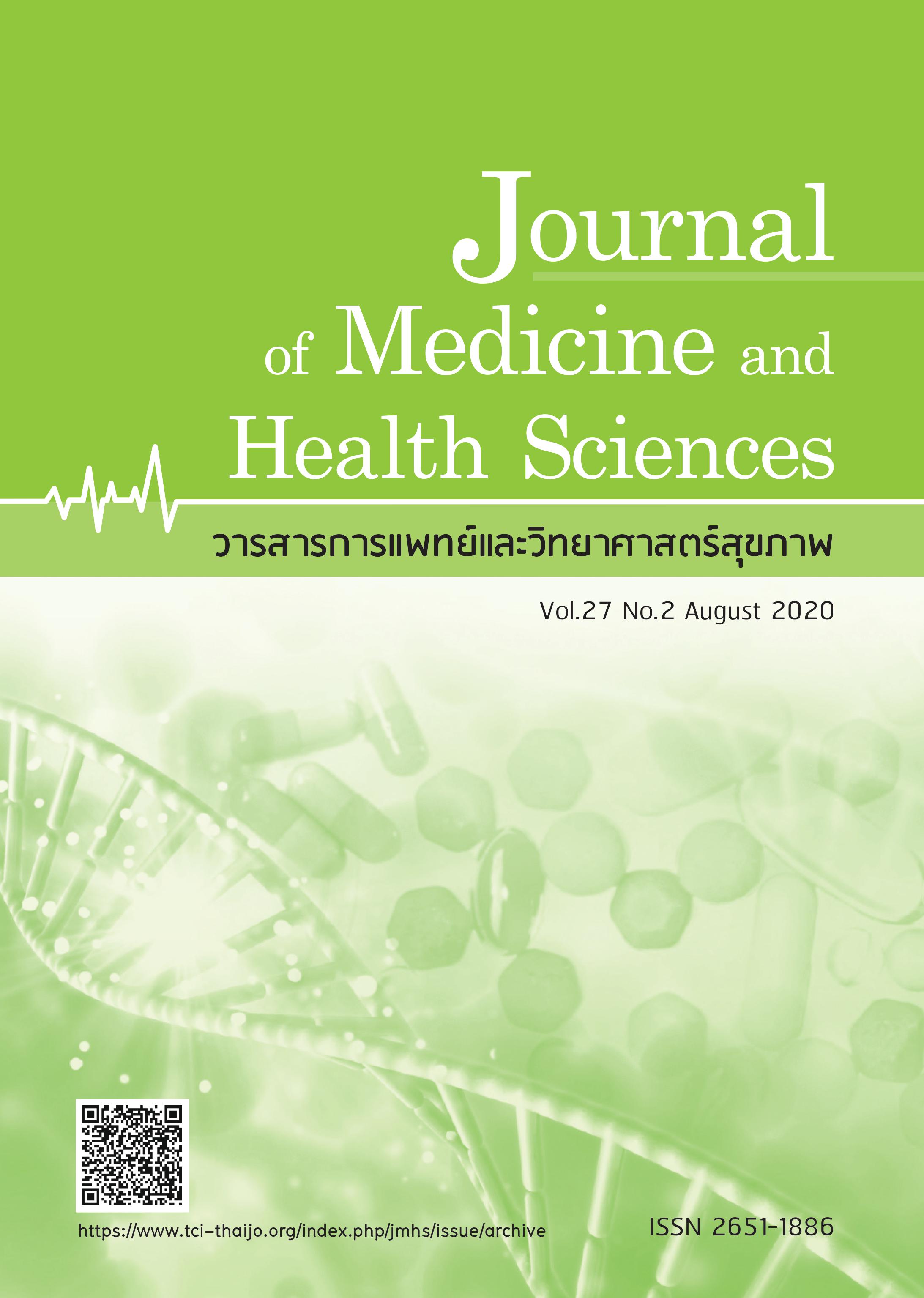Effects of breastfeeding promotion program on efficiency of breastfeeding and rate of exclusive breastfeeding for 6 months in primiparous mothers
Keywords:
breastfeeding promotion program, effective breastfeeding, exclusive breastfeeding for 6 monthsAbstract
Abstract
This quasi-experimental study was aimed to evaluate the effects of the breastfeeding promotion program on the efficiency of breastfeeding and the rate of exclusive breastfeeding for 6 months in primiparous mothers between March 2018 to February 2019. Randomized the postpartum primiparous mothers to intervention group (n=84) or control group (n=84). The control group received standard cares, which were a providing group education, watching breastfeeding VDO, and breastfeeding practices demonstrated by nurse. The experimental group received the standard cares and breastfeeding promotion program, comprised of providing breastfeeding knowledge through the teaching media on the iPad, and the manual breastfeeding documentation, along with practice breastfeeding skills with one-on-one coaching. The research instrument was the breastfeeding promotion program. Data were collected by general information questionnaire, effective breastfeeding record form, and breastfeeding record form. Collecting knowledge with breastfeeding knowledge test, which was difficulty index and discrimination index equal to 0.86 and 0.20 respectively, and collected breastfeeding satisfaction by questionnaire, which was Cronbach’s Alpha Coefficient of confidence equal to 0.93. Data were analyzed by descriptive statistics and hypothesis was tested with inferential statistics. The results found that experimental group had the average breastfeeding efficiency score on the first, second and third day after birth increased respectively (p<0.05), although the average score on the third day after birth between both groups were insignificantly (p>0.05). The average breastfeeding knowledge score was at high level of 98.75%, which was significantly higher than standard (80%) and control group (p<0.05). The satisfaction score with the program was at the highest level of 91.25%, which was significantly higher than standard (80%) and control group (p<0.05), and the exclusive breastfeeding rate in the 6 months of the intervention group was 35%, which was significantly higher than the control group (p<0.05). Therefore, the breastfeeding promotion program should be implemented to use for caring the mother after the first birth.
References
WHO, NUNICEF. Baby friendly hospital initiative revised updated and expanded for integrated care Switzerland: WHO Document Production Services; 2009 [Available from: www.unicef.org/french/nutrition/files/BFHI_2009_s3.slides.pdf].
Foundation TBC, editor Breastfeeding and Work -Let’s Make it Work. The 5th National Breastfeeding Conference; 2015 September, 2-4 2015; Montien Riverside Hotel, Bangok. Bangkok: Print and More; 2015.
Victora CG, Bahl R, Barros AJ, et al. Breastfeeding in the 21st century: epidemiology, mechanisms, and lifelong effect. Lancet 2016;387(10017):475-90.
Health MoP. 5 Flagship Projects A.D.2014. 2nd ed. Nonthaburi: Department of Health, Ministry of Public Health.; 2014 Febuary 27, p. 221.
Office NS, Thailand U. Multiple Indicators Cluster Survey (MICS): The survey of the situation of children and women in Thailand 2015-2016. Full report. Bangkok:UNICEF Office for Thailand; 2016 June 28,2017.
Liu L, Zhu J, Yang J, et al. The effect of a perinatal breastfeeding support program on breastfeeding outcomes in primiparous mothers. West J Nurs Res 2017;39(7):906-23.
Menon P, Nguyen PH, Saha KK, et al.Impacts on breastfeeding practices of atscale strategies that combine intensive interpersonal counseling, mass media,and community mobilization: results of cluster-randomized program evaluations in Bangladesh and Viet Nam. PLOS med 2016;13(10).
Owatanapanich S, Sommang K, Sukprasong P. Factors related to successful breastfeeding at King Narai Hospital, Lopburi Province. J Health Sci 2017;24(2):200-10.
Imdad A, Yakoob MY, Bhutta ZA. Effect of breastfeeding promotion interventions on breastfeeding rates, with special focus on developing countries. BMC Public Health 2011;11(3):1-8.
Yuangthong S, Sawatphanit W, Deoisres W. The effect of breastfeeding promoting program for first-time postpartum mothers on breastfeeding duration and behaviors.
PHJBUU 2014;7(2):100-15.
Butchan P, Chamusri S, Singhala K. Effects of breastfeeding promoting program on family members self-efficacy and breastfeeding promotion behavior in community. J Nursing Health Care 2016;34(4):97-105.
Ward KN, Byrne JP. A critical review of the impact of continuing breastfeeding education provided to nurses and midwives. J Hum Lact 2011;27(4):381-93.
Plodpluang U, Srichan A, Kaewpraphan S. Effect of breastfeeding promotion based on familial support program to knowlege, attitude and behavior of postpartum mothers and familiar’s members. PRRJ 2016;11(2):41-52
Arthibenyakul C, Sangperm P, Prasopkittikun T, et al. The effects of self-efficacy promoting program on perceived self-efficacy, efficiency of breastfeeding and breastfeeding rate among mothers of late preterm infants.J Nurs Sci 2017;35(1):23-35.
Khakhong S, Nirattharadorn M. The effects of promoting self-efficacy program on breast feeding behavior among adolescent mothers in community. J Public Health 2017;47(1):31-43.
Murray SS, McKinney ES. Foundation of maternal-newborn and women’s health nursing. 6th ed. United States of America: Elservir Saunders; 2014.
Hatfield NT. Introductory maternity and pediatric nursing. 3rd ed. China: Wolters Kluwer Health; 2014.
Yang S-F, Salamonson Y, Burns E, et al. Breastfeeding knowledge and attitudes of health professional students: a systematic review. Int Breastfeed J 2018;13(1):8.
Thussanasupap B, Lapvongwatana P, Kalampakorn S, et al. Effects of the community-based breastfeeding promotion program for working mothers: A quasi-experimental study. Pac Rim Int J Nurs Res 2016;20(3):196-209.
Wallenborn JT, Ihongbe T, Rozario S, et al. Knowledge of breastfeeding recommendations and breastfeeding duration: A survival analysis on infant feeding practices II. BREASTFEED MED 2017;12(3):156-62.
Abd-Allah N, Nasr E, Hassan H. Impact of a breast feeding educational program for mothers having pre-term infants in general hospitals in port said. IJNRHN 2017;4(3):215-25.
Sangploy T, Sriarporn P, Xuto P. Effect of social support on breastfeeding behavior among mothers with preterm delivery. Nursing J 2016;43(3):13-23.
Evans A, Marinelli KA, Taylor JS. ABM clinical protocol#2: Guidelines for hospital discharge of the breastfeeding term newborn and mother: “The going home protocol.” revised 2014. BREASTFEED MED 2014;9(1):3-8.
Chiengta P, Baosoung C, Kantaruksa. Effects of social support on success in exclusive breastfeeding among primiparous mothers. Nursing J 2014;41(3):1-12.
Wongphinit U, Sinsuksai N, Yusamran C. Personal factors, social support and effective suckling at discharge in predicting exclusive breastfeeding at one month among first-time mothers. JRTAN 2016;17 (1):88-95.
Buttham S, Kongwattanakul K, Jaturat N, et al. Rate and factors affecting nonexclusive breastfeeding among Thai women under the breastfeeding promotion program. J Women’s Health 2017;9:689.



